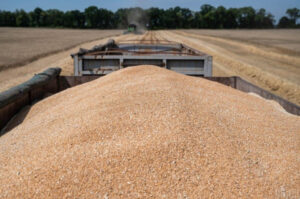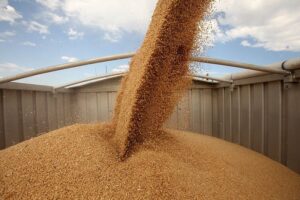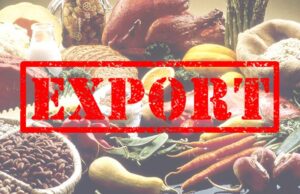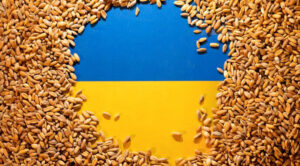
Romania, Hungary and Slovakia will not limit the transit of agricultural products from Ukraine, but negotiations continue on the issue of imports into the countries’ territory. Imports into Poland in transit mode will resume with a T1 declaration, with the use of the SENT system to track the movement of cargo through Poland and cargo seals, said Agrarian Policy Minister Mykola Solsky at an extraordinary meeting of the Coordinating Council under the Agrarian Policy Ministry on Tuesday evening.
According to him, shipments of agricultural products, which will be delivered to Poland in transit, will continue to move across the country’s territory at 00:00 on April 21, accompanied by Polish customs officers.
The issue of transit by rail with the transshipment from wide-rail wagons (for tracks 1520 mm) to narrow-rail (for tracks 1435 mm) is still open. Market participants are expected to receive details of the procedure tomorrow at the Coordinating Council of the Ministry of Agriculture, which is scheduled for 10:30 a.m.
The ban on imports of agricultural products in accordance with the list in the annex to the order of the Minister of Development and Technology of Poland Waldemar Buda from April 15, 2023 has not been canceled.
Earlier it was reported that Ukraine and Poland agreed on the resumption of transit of banned for importation agricultural products: it will work at night from April 20 to April 21, 2023. Additional control measures will be applied to the transit. According to the Ministry of Agriculture of Poland, customs, tax and other services will accompany the transport to its destination. In addition, the SENT mechanism and electronic seals will be applied, by means of which each consignment of goods will be tracked.
Poland on April 15, after the farmers’ congress, made a unilateral decision to temporarily prohibit the import of any agricultural products from Ukraine until June 30, 2023. This happened despite the fact that on July 7, a bilateral agreement was reached with Ukraine on the temporary suspension of exports of only four crops – wheat, corn, rapeseed and sunflower, while transit continued, but with stricter conditions, which the parties planned to agree on quickly.
Hungary and Slovakia made similar decisions afterwards.

The list of agricultural products banned for import from Ukraine to Poland as of 16 April includes a broad list of grains, flour and starch, as well as, sugar, caramel, seeds for sowing, vegetables and fruits, including exotic ones, dairy products, honey, wine, livestock products and live animals, as well as dog and cat food packaged for retail sale.
According to the text of the annex to the decree of the Minister of Development and Technology of Poland Waldemar Buda dated April 15, 2023 (Interfax-Ukraine news agency has a copy), since April 16 imports of sugar maize (fresh and chilled) from Ukraine to Poland are prohibited, except for hybrids for sowing; Seeds of soft wheat and meslin, spelt, soft wheat and meslin, except for sowing, rye, barley, oats, grain sorghum, except for hybrids for sowing, buckwheat, millet, canary seed, other cereals, durum wheat: wheat and meslin flour; rye flour; wheat cereals; malt, even roasted; grain flour; and, corn, barley and oat flakes; wheat, corn, potato and other kinds of starch.
The list also included lactose, maltose, glucose, fructose in solid form; sugar syrups without added flavorings or colorings, artificial honey mixed or not with natural honey; and caramel. Also sugar beet, sugar cane, cane or beet sugar, including chemically pure sucrose, maple sugar and maple syrup. Melass obtained from the extraction or refining of sugar, beet pulp.
A range of seeds for sowing, including sweet corn hybrids, seed peas, chickpeas, crude rice, grain sorghum hybrids, linseeds; canola seeds, sunflower seeds (crushed or uncrushed; for sowing), other oilseeds and fruits; flax and hemp;
The range of fruits and vegetables prohibited for importation includes: tomatoes fresh or chilled, onions, shallots, garlic, leeks and other onion vegetables; cabbage, cauliflower, kohlrabi, leafy cabbage and similar edible vegetables; lettuce (Lactuca sativa) and chicory (Cichorium spp. ), carrots, turnips, salad beets, goatweed, celery, radishes and similar edible root vegetables, fresh or refrigerated. Also, cucumbers and gherkins, fresh or refrigerated; leguminous vegetables, peeled or unpeeled, fresh or refrigerated; nuts; fresh and dried bananas; fresh figs; pineapples; avocados; guavas mangoes and mangosteens; citrus fruits; table grapes, fresh; melons (including watermelons); papaya; apples, pears and quinces, fresh apricots, cherries, peaches (including nectarines), plums, other fruits.
It is prohibited to import not only raw vegetables, but also steamed or cooked in water, frozen, canned, dried. Under the ban are jams, marmalades, marmalades, fruit purees; wine, including grape juice and grape must; wine made from fresh grapes, including fortified wines; fresh grapes, except table grapes; vinegar.
The list includes a wide range of animal products: beef, veal, live animals of domestic species of cattle, except purebred farm animals; meat of cattle, fresh or chilled; beef frozen, salted, in brine, dried or smoked; Meat or meat by-products meal and meal; other prepared or preserved meat; live stock – thoroughbred breeding animals; preserved meat; by-products and offal; poultry meat and offal; Pig fat, meat and edible by-products of domestic pigs, sausages and similar products of meat, meat by-products or blood; swine fat (including lard); prepared products or preserves of the liver of any animal except goose or duck; pigs; mutton and goat meat; lambs (under one year of age), live sheep, except purebred breeding animals and lambs; sheep and goat meat; live swine; chilled and frozen swine meat; horses, including purebred breeding animals.

Exports of agricultural products from Ukraine in March 2023 increased by 12% compared to the previous month and reached a record 7.8 million tons since the war, the Ukrainian Confederation of Agrarian Business (UCAB) said in a statement on its website.
“51% of exports in March 2023 were made through the work of the “grain corridor”, and the rest through alternative export routes. However, it is necessary to take into account that not all products had time to physically cross the border,” UCAB pointed out.
According to the data of UCAB, in March 2023, vegetable oils showed the largest increase in the structure of exports – by 28%, to 556.2 thousand tons, oilseeds – by 23%, to 683.1 thousand tons, cereals – by 10%, to 5.7 million tons (corn – 67%, wheat – 29%, barley – 4%) and oilcake – by 10%, to 454.7 thousand tons (sunflower – 83%, soybean oil – 17%).
According to analysts, the important news for the Ukrainian export in March 2023 was the continuation of the “grain corridor”.
“The existence of such an export channel gives hope to Ukrainian agrarians to realize the rest of products of the 2022 harvest and receive funds to continue their economic activities, beginning from the spring sowing season, which is already in full swing”, – the UCAB noted.
The main problem is the significant gap between the world price and the price of major crops on the Ukrainian market. Reducing of this gap would help farmers to accumulate funds for the purchase of fertilizers, pesticides, the use of which will be minimal this year due to limited financial resources of farmers, UCAB summarized.

Ukraine exported 3.8 million tonnes of agricultural products under the grain deal in March, 500,000 tonnes more than in February, the Agrarian Policy Ministry of Ukraine reported on March 31.
This included 908,000 tonnes of wheat and 2.3 million tonnes of corn.
The ministry said 374,000 tonnes of wheat, 120,000 tonnes more than in February, was shipped to countries in need, including 60,000 tonnes shipped to Yemen and Ethiopia under humanitarian programs.
At the same time, the Ministry of Agrarian Policy said that over the past three months of the functioning of the corridor, the number of vessels passing the Bosphorus has been steadily fluctuating in the range of less than 3 instead of 6-7 possible, and the worst figure was in January – 2.5.
“Today is the end of the 8th month of the grain corridor. The indicators for March differ little from February. In particular, the statistics of the number of ships passing per day have not changed for the better. We have an indicator of 2.8,” the ministry said.
A total of 26.3 million tonnes of Ukrainian agricultural products, including 7.3 million tonnes of wheat and 12.9 million tonnes of corn have been exported in the eight months since the agreement on the grain corridor for Ukrainian exports was struck, the ministry said. Almost 2 million tonnes or 26.4% of this wheat was shipped to countries in need, it added.
“However, there are countries where the supply of our grain has dipped due to the unpredictability of the functioning of the corridor and the unwillingness of buyers to take risks. Among them is Indonesia. If before the war we sent 2.6 million tonnes of wheat there, which was 24% of their annual needs of 11 million tonnes , then only 341,000 tonnes went there during the last marketing season, which is only 4%,” the Ministry of Agrarian Policy said.
The UN, Russia, Turkey and Ukraine signed two documents in Istanbul on July 22, 2022 on the creation of a corridor to ship out grain from three Ukrainian ports – Chornomorsk, Odesa and Pivdenny, as well as to lift barriers to exports of Russian foodstuffs and fertilizers. The arrangement was extended for 120 days in November 2022, and in March 2023 Russia agreed to another extension of 60 days.

Ukraine exported 6.9 million tons of agricultural products in February 2023, up 14% from the previous month, the association Ukrainian Agribusiness Club (UCAB) said on its Facebook page on Monday.
“This growth was tangible against the background of the fall in the indicator last month, and so – this is the average figure for the last six months. 49% of exports in February 2023 was realized through the work of the “grain corridor,” and the rest through alternative export routes. However, we must necessarily take into account that not all products had time to physically cross the border”, – clarifies the message of the Association.
UCAB notes that in February 2023 it exported 5.2 million tons of grain crops, which is 23% more than in January. By crops, 3.33 million tons of corn (64% of the total), 1.61 million tons of wheat (31%) and 21 thousand tons of barley (4%) were exported to foreign markets.
Ukraine also exported 557 thousand tons of oilseeds during this period – 30% less than in January. Abroad, 328.6 thousand tons of soybeans (59%), 167.1 thousand tons of sunflower seeds (30%) and 61.3 tons of rapeseed (11%).
UCAB also noted that exports of vegetable oils in February increased by 4% against the previous month – up to 435.7 thousand tons, 93% of which was sunflower oil (405.2 thousand tons) and 7% – soybean oil (26.1 thousand tons). In turn, exports of sunflower and soybean cake and meal decreased by 4% to 414.1 thousand tons, including 85% of sunflower waste (351.9 thousand tons) and 15% of soybean waste (62.1 thousand tons).
“February-2023 was the highest monthly export of grain crops since the beginning of the war – 5.2 million tons. Part of this growth was due to a decrease in oilseed crop exports. With the decline in oilseed exports due to the end of export stocks of rapeseed and the reorientation of sunflower seeds to the domestic market, it became possible to export more crops,” UCAB stressed in a report.
As previously reported UCAB, Ukraine exported 7 million tons of agricultural products in December 2022, in November – 7.2 million tons, in October and September – 6.9 million tons, in August – 4.6 million tons, in July – 3 million tons, in June – 2.7 million tons. According to the Ministry of Agrarian Policy of Ukraine, in May agricultural exports amounted to 1.74 million tons, in April – 0.96 million tons, in March – 0.33 million tons.
Prior to the full-scale military invasion by the Russian Federation, Ukraine used to export an average of 5-6 million tons of agricultural products per month, mainly through its maritime infrastructure in the Black Sea.